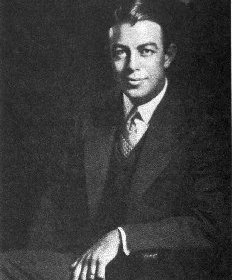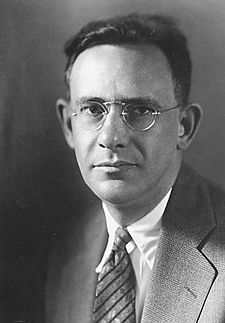Related Research Articles

Benjamin Lee Whorf was an American linguist and fire prevention engineer who is famous for proposing the "Sapir–Whorf hypothesis." He believed that the structures of different languages shape how their speakers perceive and conceptualize the world. Whorf saw this idea, named after him and his mentor Edward Sapir, as having implications similar to Einstein's principle of physical relativity. However, the concept originated from 19th-century philosophy and thinkers like Wilhelm von Humboldt and Wilhelm Wundt.

Edward Sapir was an American anthropologist-linguist, who is widely considered to be one of the most important figures in the development of the discipline of linguistics in the United States.
The following outline is provided as an overview and topical guide to linguistics:
Dell Hathaway Hymes was a linguist, sociolinguist, anthropologist, and folklorist who established disciplinary foundations for the comparative, ethnographic study of language use. His research focused upon the languages of the Pacific Northwest. He was one of the first to call the fourth subfield of anthropology "linguistic anthropology" instead of "anthropological linguistics". The terminological shift draws attention to the field's grounding in anthropology rather than in what, by that time, had already become an autonomous discipline (linguistics). In 1972 Hymes founded the journal Language in Society and served as its editor for 22 years.
Sociolinguistics is the descriptive study of the effect of any or all aspects of society, including cultural norms, expectations, and context, on language and the ways it is used. It can overlap with the sociology of language, which focuses on the effect of language on society. Sociolinguistics overlaps considerably with pragmatics and is closely related to linguistic anthropology.
Linguistic anthropology is the interdisciplinary study of how language influences social life. It is a branch of anthropology that originated from the endeavor to document endangered languages and has grown over the past century to encompass most aspects of language structure and use.
Anthropological linguistics is the subfield of linguistics and anthropology which deals with the place of language in its wider social and cultural context, and its role in making and maintaining cultural practices and societal structures. While many linguists believe that a true field of anthropological linguistics is nonexistent, preferring the term linguistic anthropology to cover this subfield, many others regard the two as interchangeable.
The concept of communicative competence, as developed in linguistics, originated in response to perceived inadequacy of the notion of linguistic competence. That is, communicative competence encompasses a language user's grammatical knowledge of syntax, morphology, phonology and the like, but reconceives this knowledge as a functional, social understanding of how and when to use utterances appropriately.

Discourse analysis (DA), or discourse studies, is an approach to the analysis of written, vocal, or sign language use, or any significant semiotic event.

Sociology of language is the study of the relations between language and society. It is closely related to the field of sociolinguistics, which focuses on the effect of society on language. One of its longest and most prolific practitioners was Joshua Fishman, who was founding editor of the International Journal of the Sociology of Language, in addition to other major contributions. The sociology of language studies society in relation to language, whereas sociolinguistics studies language in relation to society. For the former, society is the object of study, whereas, for the latter, language is the object of study. In other words, sociolinguistics studies language and how it varies based on the user's sociological background, such as gender, ethnicity, and socioeconomic class. On the other hand, sociology of language studies society and how it is impacted by language. As Trent University professor of global politics Andreas Pickel states, "religion and other symbolic systems strongly shaping social practices and shaping political orientations are examples of the social significance such languages can have." The basic idea is that language reflects, among several other things, attitudes that speakers want to exchange or that just get reflected through language use. These attitudes of the speakers are the sociologist's information.
The ethnography of communication (EOC), originally called the ethnography of speaking, is the analysis of communication within the wider context of the social and cultural practices and beliefs of the members of a particular culture or speech community. It comes from ethnographic research It is a method of discourse analysis in linguistics that draws on the anthropological field of ethnography. Unlike ethnography proper, though, EOC takes into account both the communicative form, which may include but is not limited to spoken language, and its function within the given culture.
John Joseph Gumperz was an American linguist and academic. Gumperz was, for most of his career, a professor at the University of California, Berkeley. His research on the languages of India, on code-switching in Norway, and on conversational interaction, has benefitted the study of sociolinguistics, discourse analysis, linguistic anthropology, and urban anthropology.
Kira Hall is professor of Linguistics and Anthropology, as well as director for the Program in Culture, Language, and Social Practice (CLASP), at the University of Colorado at Boulder.
Michael Silverstein was an American linguist. He was the Charles F. Grey Distinguished Service Professor of anthropology, linguistics, and psychology at the University of Chicago. He was a theoretician of semiotics and linguistic anthropology. Over the course of his career he created an original synthesis of research on the semiotics of communication, the sociology of interaction, Russian formalist literary theory, linguistic pragmatics, sociolinguistics, early anthropological linguistics and structuralist grammatical theory, together with his own theoretical contributions, yielding a comprehensive account of the semiotics of human communication and its relation to culture. He presented the developing results of this project annually from 1970 until his death in a course entitled "Language in Culture." Among other achievements, he was instrumental in introducing the semiotic terminology of Charles Sanders Peirce, including especially the notion of indexicality, into the linguistic and anthropological literature; with coining the terms metapragmatics and metasemantics in drawing attention to the central importance of metasemiotic phenomena for any understanding of language or social life; and with introducing language ideology as a field of study. His works are noted for their terminological complexity and technical difficulty.
Mary Bucholtz is professor of linguistics at UC Santa Barbara. Bucholtz's work focuses largely on language use in the United States, and specifically on issues of language and youth; language, gender, and sexuality; African American English; and Mexican and Chicano Spanish.
Linguistics is the scientific study of language. Linguistics is based on a theoretical as well as a descriptive study of language and is also interlinked with the applied fields of language studies and language learning, which entails the study of specific languages. Before the 20th century, linguistics evolved in conjunction with literary study and did not exclusively employ scientific methods.
Interactional sociolinguistics is a subdiscipline of linguistics that uses discourse analysis to study how language users create meaning via social interaction. It is one of the ways in which linguists look at the intersections of human language and human society; other subfields that take this perspective are language planning, minority language studies, quantitative sociolinguistics, and sociohistorical linguistics, among others. Interactional sociolinguistics is a theoretical and methodological framework within the discipline of linguistic anthropology, which combines the methodology of linguistics with the cultural consideration of anthropology in order to understand how the use of language informs social and cultural interaction. Interactional sociolinguistics was founded by linguistic anthropologist John J. Gumperz. Topics that might benefit from an Interactional sociolinguistic analysis include: cross-cultural miscommunication, politeness, and framing.
Penelope "Penny" Eckert is Albert Ray Lang Professor Emerita of Linguistics at Stanford University. She specializes in variationist sociolinguistics and is the author of several scholarly works on language and gender. She served as the president of the Linguistic Society of America in 2018.
Linguistic ecology or language ecology is the study of how languages interact with each other and the places they are spoken in, and frequently argues for the preservation of endangered languages as an analogy of the preservation of biological species.
John Gordon Baugh V is an American academic and linguist. His main areas of study are sociolinguistics, forensic linguistics, education, and African American language studies. He is currently the Margaret Bush Wilson Professor in Arts and Sciences at Washington University in St. Louis, Professor Emeritus at Stanford University, and President of the Linguistic Society of America. In 2020 Baugh was elected as a fellow of the American Association for the Advancement of Science in the section on Linguistics and Language Sciences, and in 2021 he was elected to the American Academy of Arts and Sciences.
References
- ↑ Hult, F.M. (2010). Theme-based research in the transdisciplinary field of educational linguistics. In F.M. Hult (Ed.), Directions and prospects for educational linguistics (pp. 19-32). New York: Springer.
- ↑ Bucholtz and Hall (2008). "All of the Above: New Coalitions in Sociocultural Linguistics". Journal of Sociolinguistics: 410–431 – via ResearchGate.
- Bucholtz, Mary, and Kira Hall. 2005. "Identity and Interaction: A Sociocultural Linguistic Approach." Discourse Studies 7(4-5).
- Hymes, Dell. 1964. "Introduction: Toward Ethnographies of Communication." American Anthropologist 66(6), part 2, 1-34.
- Sapir, Edward. 1929. "The Status of Linguistics as a Science." Language 5(4), 207-214.